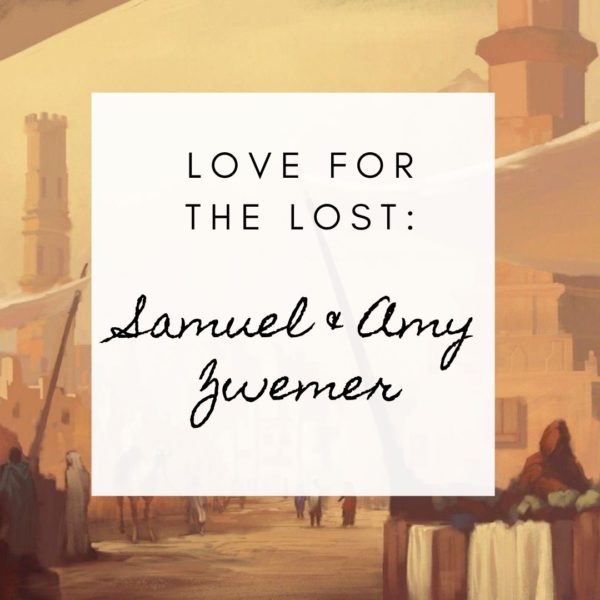“The Cross of CHRIST is the searchlight of GOD.
It reveals GOD’s love and man’s sin;
GOD’s power and man’s helplessness,
GOD’s holiness and man’s pollution.”
–Samuel M. Zwemer, The Glory of the Cross
Having many Muslim family members and knowing how difficult it can be at times to share the Gospel with people of the Islamic faith, I was intrigued by the idea of learning more about the American missionary long designated as “the Apostle to Islam.” As I dug deeper into this man’s history–rich in theology and an unswerving commitment to an enormous percentage of the world’s population largely ignored and considered “unreachable” at the time–I also learned what an impact his wife made on their ministry and that, together, they showed the unfailing love of Jesus to the lost.

Consecrated to God
Samuel Marinus Zwemer was born in Michigan in 1867. Like his Old Testament namesake, Samuel was consecrated to service to the Lord from infancy (a fact Zwemer did not learn until years later). When he was almost 17 years of age, Samuel put his faith in Jesus Christ. Soon after, he became active in campus missions. While at seminary, he met with other students and an Old Testament professor who had been a missionary in Egypt. Their meetings began with planning a mission to Muslims, which ultimately led them to focus on Arabia–one of the most difficult regions to send and support Christian missions.
Because Muslims were viewed as extremely hostile toward Christians, Zwemer and his comrades could not find any American mission agencies to sponsor them (like our friend, David Brainerd). So, when Samuel was 21, they formed their own agency: the Arabian Mission. He was often quoted as saying, “If God calls you and no board will send you, bore a hole through the board and go anyway.” Two years later, after his ordination, Samuel sailed to the Middle East to study the Arabic language, eventually settling in Basrah for six years.
God Sends a Helper
When an Australian mission sent two young women missionaries to Basrah, Zwemer was the one to teach them Arabic. Soon he and one of the women, Amy Wilkes, a trained nurse, fell in love and married. (The story goes that the Australian mission insisted that Samuel reimburse them for Amy’s travel expenses, since she would no longer be working for them, and from then on, Samuel would joke that he followed the Arabian custom of purchasing a bride!). Samuel was a prolific writer, but Amy herself authored three children’s books about the customs and life of Arab people.
Just before the turn of the century, Amy began the first girl’s school in Manama, by which she was able to reach into the homes of women in the community. Only three years later, the school went from a homeschool to meeting in a building; what began as an all-girls school expanded to boys, and the American Mission School still exists today.
Because of Amy’s medical training, the Zwemers also opened a mission hospital in 1903, but loss and suffering came on the heels of triumph. The following year, their two daughters, Katharina (seven) and Ruth (four), contracted malaria and died within a week of each other. Close to the school their family had founded and which they had attended, the girls were buried. On their tombstones were etched the words, “Worthy is the Lamb to receive riches.”
“Worthy is the Lamb that was slain to receive power, and riches, and wisdom, and strength, and honour, and glory, and blessing.” –Revelation 5:12, KJV
An Unflagging Spirit
Through setback, heartbreak, and few victories in the way of converts, the Zwemers never faltered in the desire to see Jesus glorified through the salvation of the people of Islam. “What motivated the Zwemers was that they never stopped marveling at what Christ had done for them on the cross, and they wanted Muslims to experience the same” (Roger Greenway). In his lifetime, Samuel spoke in Egypt and numerous countries across North Africa, South Africa, Indonesia, and China, as well as across the United States.
As I studied Samuel’s life, what impressed me most was not his zeal, but the focus of his passion. Through all his days, he continued to tell other Christians that “to be a missionary to Muslims required a strong Christology and an overpowering emphasis on the unique work of Christ in the atonement and the resurrection” (Greenway).
“The Cross is the centre of the universe and of history. It will yet witness the reconciliation of all things upon the earth or things in the heavens through His blood.” –Samuel M. Zwemer, The Glory of the Cross
Because the Zwemers camped at the foot of the cross, they continually saw their need for and the glory of the Savior. I think it was this humble, worshipful posture that sustained them through decades of ministry. Heaven was not just their home, it was a place to which they wanted to ensure they would continue to acquire neighbors. How fitting that when Samuel Zwemer died just before his 85th birthday, he was laid to rest in the only piece of land he ever owned on this earth: his burial plot. Just like Abraham. “For he was looking forward to the city that has foundations, whose designer and builder is God.” (Hebrews 11:10)
Greenway, Roger S. “Brief Biography of Samuel Zwemer.” https://www.zwemercenter.com/brief-biography-of-samuel-zwemer/
Larson, Dr. Warren. “A Lasting Legacy of Samuel and Amy Zwemer in Bahrain.” https://www.zwemercenter.com/a-lasting-legacy-of-samuel-and-amy-zwemer-in-bahrain/

Join the Discussion